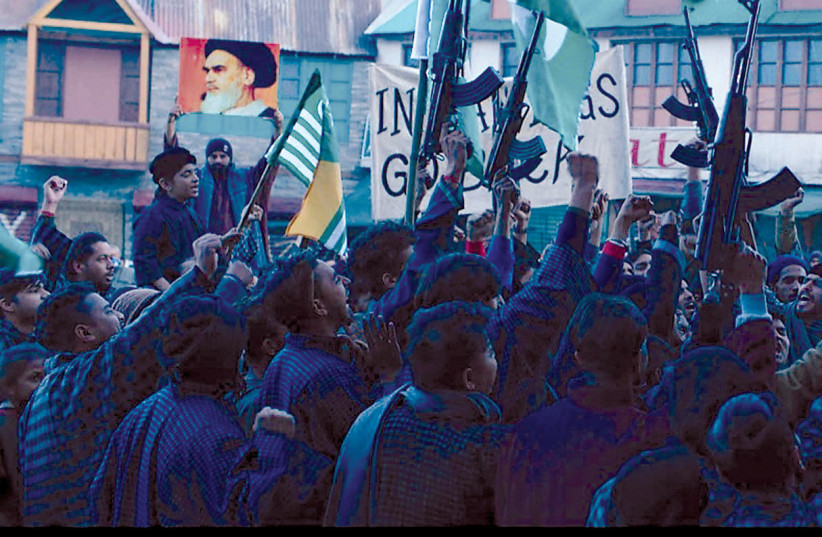Israeli filmmaker Nadav Lapid sparked an outburst of controversy in India this week after slamming the successful Bollywood movie The Kashmir Files of being anti-Muslim propaganda.
The film was a success at the box office in India and had been met with controversy upon its release, especially from Muslims. However, it was also met with praise by many others, including India's Hindu nationalist government.
The outrage caused by Lapid has even resulted in Israel's ambassador to India criticizing the filmmaker.
Nadav Lapid and <em>The Kashmir Files</em>: An Israeli director slams "Islamaphobic" Bollywood hit
Widely considered one of Israel's most acclaimed and successful directors, Lapid was chosen to serve as chair of a panel of the international film festival of India (IFFI), an event in which The Kashmir Files were included.
Directed by Vivek Agnihotri, the film's two-and-a-half-hour plot is centered around the events of 1990 when ethnic Hindus, known as Pandits, were allegedly forced from their homes by Kashmiri Muslims in what has been known as the Pandit Exodus.

But from the very beginning, the film was controversial. This is because the exodus was depicted to be an outright genocide by Kashmiri Muslims who had been subjected to nationalist and Islamist radicalization and the details of this alleged ethnic cleansing had all been long kept secret by a conspiracy of silence.
Co-director Pallavi Joshi told The Jerusalem Post's In Jerusalem supplement back in June that she and Agnihotri had supposedly discovered a cover-up.
"The government, media, and academics had all colluded to appease 'minorities,' meaning no minority other than one minority whose votes they needed. The Pandits were only 2% of the Kashmiri population, so they were not a vote bank," she explained.
"We interviewed 700 survivors in long format, and I was chilled to the bones by what I heard. I felt guilt that during the events we had been sitting pretty and enjoying life. I felt our government had betrayed us."
There have long been views and accusations of this having happened in Kashmir, particularly among some of India's Hindu nationalist Right. Indeed, many high-ranking Indian political leaders have endorsed the film with Prime Minister Narendra Modi praising it for having "the guts to portray the truth," according to The Guardian.
However, historians have maintained that this narrative of Kashmir is inaccurate.
Lapid was another critic of the film. At the closing ceremony of the film festival, he said that The Kashmir Files being included left him "shocked and disturbed," describing the movie as "a propaganda, vulgar movie, inappropriate for an artistic competitive selection of such a prestigious film festival," according to The Indian Express.
This sparked backlash from a number of sources, including the film's director, political figures and even Israel's own ambassador.
Ambassador Naor Gilon, who was also at the event, took to Twitter Tuesday to criticize Lapid in a long thread.
"It’s not in Hebrew because I wanted our Indian brothers and sisters to be able to understand," Gilon wrote. "It is also relatively long so I’ll give you the bottom line first. YOU SHOULD BE ASHAMED. Here’s why."
Gilon criticized Lapid for abusing India's hospitality, respect and trust; claiming that Gilon said India and Israel are similar because they "fight a similar enemy and reside in a bad neighborhood" when in fact he just spoke about growing up watching Indian cinema; speaking about sensitive historical events without studying them; and comparing the film to what Lapid dislikes about current Israeli politics.
"The friendship between the people and the states of India and Israel is very strong and will survive the damage you have inflicted," Gilon concluded.
"As a human being, I feel ashamed and want to apologize to our hosts for the bad manner in which we repaid them for their generosity and friendship."
Amit Malvia, a senior leader of India's ruling Bharatiya Janata Party (BJP), also harshly criticized Lapid and equivocated his statements to Holocaust denial.
"For the longest time, people even denied the Holocaust and called Schindler’s List a propaganda, just like some are doing to Kashmir Files," Malviya wrote on Twitter. "Truth eventually triumphs, no matter what."
The film's director, Agnihotri, has long defended The Kashmir Files as depicting the "truth of Kashmir."
In an official statement, Joshi wrote that "Vivek and I were always aware that there are elements that would not like to see the stark truth on the screen, but it is very unfortunate that a creative platform was used for a political agenda to preserve an old, false and jaded narrative about Kashmir."
Regarding the criticism from Lapid, Agnihotri said "terror supporters and genocide deniers can never silence me" on Twitter, further adding: "I challenge all the intellectuals in this world and this great film-maker from Israel to find one frame, one dialogue or an event in The Kashmir Files that is not true."
Yeshaya Rosenman contributed to this report
